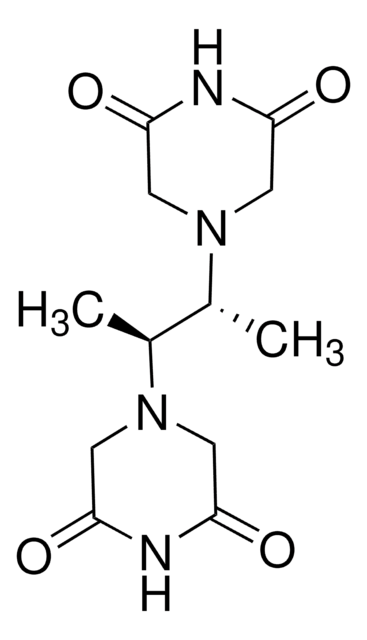E1383
Etoposide
95.0-105.0% (anhydrous basis), powder, topoisomerase II inhibitor
Synonym(s):
4′-Demethylepipodophyllotoxin 9-(4,6-O-ethylidene-β-D-glucopyranoside), VP-16-213
About This Item
Recommended Products
product name
Etoposide, synthetic, 95.0-105.0%, powder
biological source
synthetic
Assay
95.0-105.0%
form
powder
color
white to off-white
pKa
9.8
mp
236-251 °C (lit.)
antibiotic activity spectrum
neoplastics
Mode of action
DNA synthesis | interferes
enzyme | inhibits
originator
Teva
SMILES string
COc1cc(cc(OC)c1O)[C@H]2[C@@H]3[C@H](COC3=O)[C@H](O[C@@H]4O[C@@H]5CO[C@@H](C)O[C@H]5[C@H](O)[C@H]4O)c6cc7OCOc7cc26
InChI
1S/C29H32O13/c1-11-36-9-20-27(40-11)24(31)25(32)29(41-20)42-26-14-7-17-16(38-10-39-17)6-13(14)21(22-15(26)8-37-28(22)33)12-4-18(34-2)23(30)19(5-12)35-3/h4-7,11,15,20-22,24-27,29-32H,8-10H2,1-3H3/t11-,15+,20-,21-,22+,24-,25-,26-,27-,29+/m1/s1
InChI key
VJJPUSNTGOMMGY-MRVIYFEKSA-N
Gene Information
human ... ABCB1(5243) , CYP3A4(1576) , TOP2A(7153) , TOP2B(7155)
mouse ... Abcb1a(18671) , Abcb1b(18669)
rat ... Top2a(360243)
Looking for similar products? Visit Product Comparison Guide
General description
Application
- to prepare drug stock solution in dimethyl sulfoxide (DMSO) and also to profile and compare the sensitivity of DT40 mutant cells
- to incubate cells for cell viability assay
- to treat neuro-2A cells to induce programmed cell death
Biochem/physiol Actions
Features and Benefits
Packaging
Signal Word
Danger
Hazard Statements
Precautionary Statements
Hazard Classifications
Acute Tox. 4 Oral - Carc. 1B - Repr. 2
Storage Class Code
6.1C - Combustible acute toxic Cat.3 / toxic compounds or compounds which causing chronic effects
WGK
WGK 3
Personal Protective Equipment
Certificates of Analysis (COA)
Search for Certificates of Analysis (COA) by entering the products Lot/Batch Number. Lot and Batch Numbers can be found on a product’s label following the words ‘Lot’ or ‘Batch’.
Already Own This Product?
Find documentation for the products that you have recently purchased in the Document Library.
Customers Also Viewed
Articles
Cell cycle phases (G1, S, G2, M) regulate cell growth, DNA replication, and division in proliferating cells.
Apoptosis regulation involves multiple pathways and molecules for cellular homeostasis.
Discover Bioactive Small Molecules for ADME/Tox
Our team of scientists has experience in all areas of research including Life Science, Material Science, Chemical Synthesis, Chromatography, Analytical and many others.
Contact Technical Service
















